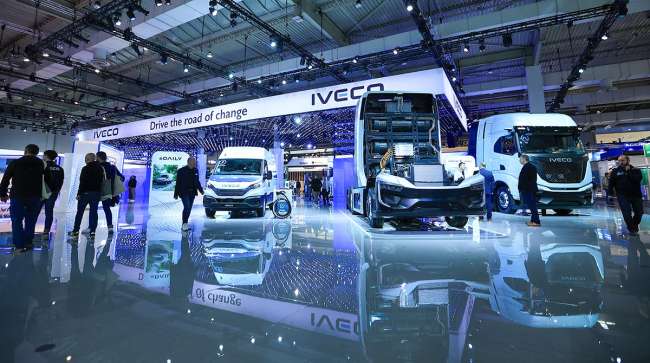Decisioni strategiche e impatto sul mercato di Iveco
Iveco Group NV ha intrapreso un significativo percorso di ristrutturazione, caratterizzato dalla sua decisione di dividere le proprie attività attraverso una serie di vendite strategiche. Le principali risorse dell'azienda, la divisione difesa e la sua divisione produzione di autocarri, vengono vendute rispettivamente a Leonardo SpA e Tata Motors Ltd. Questa manovra, valutata intorno ai 5,5 miliardi di euro (circa 6,3 miliardi di dollari), segnala un notevole cambiamento nel panorama automobilistico e logistico, con implicazioni che potrebbero ripercuotersi sui sistemi globali di trasporto e logistica.
Dettagli della Transazione
La ripartizione finanziaria di queste transazioni rivela che Leonardo pagherà 1,7 miliardi di euro per il segmento dei veicoli militari, mentre Tata Motors acquisirà il resto di Iveco per circa 3,8 miliardi di euroQuesta acquisizione non solo permette a Tata di consolidare la sua presenza nel mercato europeo dei veicoli commerciali, ma fornisce anche nuove capacità di progettazione e tecnologiche, in particolare nel trasporto sostenibile, una priorità crescente per molti consumatori europei.
Informazioni sull'espansione di Tata Motors
La ricerca di Iveco da parte di Tata Motors ricorda le sue precedenti iniziative, come l'acquisizione di Jaguar Land Rover nel 2008, segnando quasi due decenni di penetrazione costante nei principali mercati. Migliorando le proprie capacità in aree come il trasporto sostenibile, Tata si sta posizionando non solo per competere ma per guidare un settore in rapida evoluzione, influenzato dalle richieste del mercato di soluzioni più ecologiche.
Implicazioni finanziarie per le parti interessate
Le transazioni avranno senza dubbio notevoli ripercussioni per le parti interessate di Iveco. Gli azionisti sono destinati a beneficiare dell'accordo, ricevendo approssimativamente €4.10 per azione da Tata e un sostanzioso dividendo extra stimato tra Da 5,5 a 6 euro per azione dalla vendita di Leonardo. Tali movimenti finanziari sono più che semplici numeri: possono influenzare la fiducia degli investitori e, come abbiamo spesso sentito dire, “il denaro parla chiaro” in tali transazioni.
Modifiche alla forza lavoro e operative
L'attuale forza lavoro di Iveco di circa 36.000 dipendenti, prevalentemente in Europa, potrebbero affrontare cambiamenti in seguito a queste vendite. Con quasi il 40% del suo personale con sede in Italia e ulteriori sedi in Francia, Germania, Regno Unito, Cina e America Latina, il riallineamento delle risorse operative solleva interrogativi sulla stabilità del lavoro e potenziali trasferimenti, soprattutto perché Tata Motors cerca di integrare le operazioni.
Dinamiche del settore della difesa
La vendita della sua divisione difesa a Leonardo non solo permette a Iveco di focalizzarsi in modo più efficiente, ma rafforza l'importanza di mantenere tali capacità all'interno dell'Europa. L'acquisizione di Leonardo, in particolare in un contesto di pressioni competitive, è vista come un rafforzamento della sua posizione nel settore della difesa terrestre europea. Questa mossa potrebbe soddisfare le aspettative governative in merito al mantenimento del controllo locale sulle operazioni di difesa, unendo così la strategia aziendale agli interessi politici nella regione.
Sentimenti attuali del mercato e movimenti azionari
Le reazioni degli investitori sono state contrastanti. In seguito all'annuncio, le azioni di Tata Motors sono diminuite del 3.5% a Mumbai, suggerendo un potenziale scetticismo sulla fattibilità dell'acquisizione o sulla sua integrazione nella strategia più ampia di Tata. Tali fluttuazioni del mercato azionario sottolineano l'interconnessione tra le decisioni aziendali e le aspettative degli investitori, ricordandoci quanto finemente bilanciato possa essere il mercato azionario.
Il Quadro Generale: Implicazioni per la Logistica e i Trasporti
L'analisi di queste transizioni aziendali apre una finestra sui potenziali cambiamenti nella logistica e nei trasporti. Mentre aziende come Tata rafforzano la loro presenza europea, ci saranno probabilmente impatti sulle reti logistiche, soprattutto per quanto riguarda il modo in cui le merci vengono spostate attraverso i confini e utilizzate all'interno dei mercati locali. La solidità delle reti di distribuzione globali, che sono attualmente sotto pressione a causa di vari fattori, tra cui l'aumento dei costi e le mutevoli normative, potrebbe trovare nuovi percorsi o volti man mano che le strategie operative si adeguano.
Cosa significa questo per la logistica globale
Sebbene l'impatto diretto di queste acquisizioni possa sembrare limitato ai settori automobilistico e della difesa, in realtà può alterare il quadro logistico su scala globale. L'aumento della concorrenza nei veicoli commerciali potrebbe portare a cambiamenti nei costi di spedizione e trasporto, influenzando ulteriormente il modo in cui le aziende gestiscono le loro catene di approvvigionamento. Come si potrebbe dire, "è tutto collegato", e queste mosse strategiche potrebbero avere ripercussioni ben oltre le immediate impronte operative.
Conclusione: Orientarsi verso le future opportunità logistiche
Mentre il panorama automobilistico continua a evolversi con mosse significative come le vendite di Iveco, ciò evidenzia l'importanza dell'adattabilità nella logistica. Sia per i colossi aziendali che per le imprese più piccole, comprendere e anticipare questi cambiamenti può sbloccare nuove opportunità in termini di efficienza, commercio globale e meccanismi di trasporto. Per affrontare con successo le complessità della logistica, piattaforme come GetTransport.com offre risorse preziose, fornendo soluzioni di trasporto merci globali e convenienti, su misura per diverse esigenze.
In sostanza, questi cambiamenti sono più di semplici transazioni; sono opportunità di innovazione e crescita all'interno della logistica. Le esperienze personali forniranno sempre intuizioni più profonde di qualsiasi recensione o analisi possa offrire. Su GetTransport.com, gli utenti possono iniziare i loro viaggi di trasporto merci a tariffe competitive, assicurando decisioni informate in linea con le loro esigenze logistiche. La trasparenza e la convenienza della piattaforma la rendono una scelta eccezionale per chiunque cerchi di gestire la propria logistica in modo efficace.
Per chi è pronto a esplorare il futuro della logistica, consigliamo di pianificare la prossima spedizione di pacchi o container tramite GetTransport.com e approfitta delle migliori offerte disponibili!

 Ristrutturazione importante nel settore automobilistico: vendite strategiche di Iveco">
Ristrutturazione importante nel settore automobilistico: vendite strategiche di Iveco">